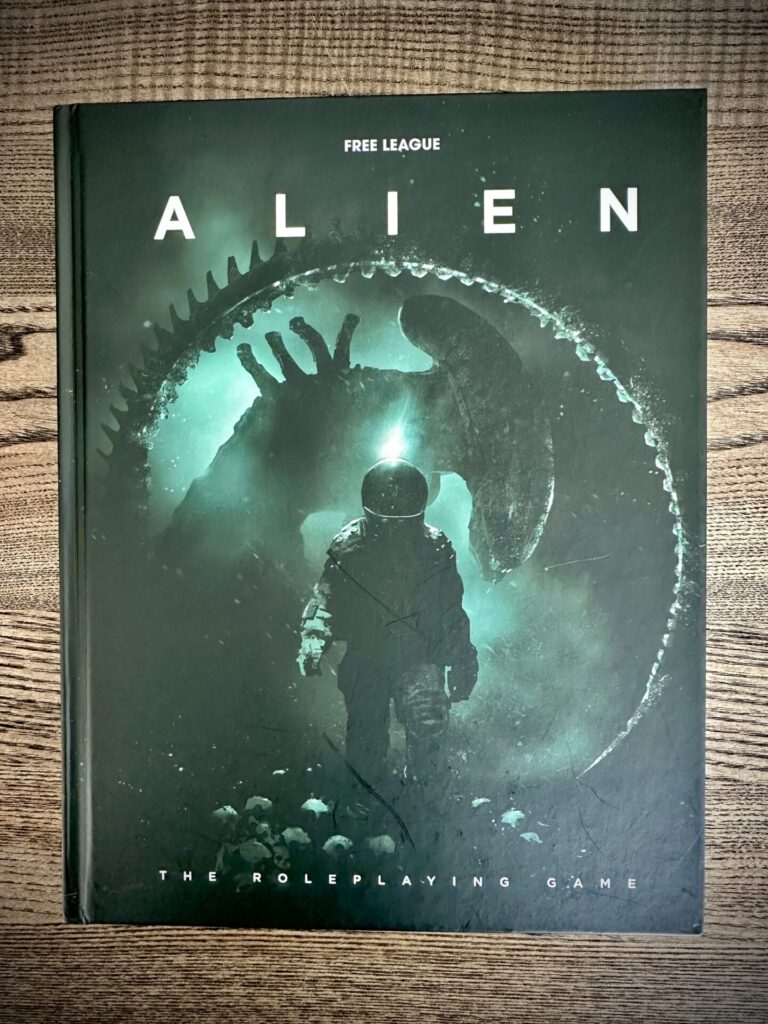We played the Alien RPG beginner box “cinematic adventure” Chariot of the Gods for the second time. Most players were new, but one of them came for a second round. What was different this time? Would I run this again?

The Cinematic Adventure
The “cinematic adventure” format is meant to generate an experience very close to the source material, in this case the original movie in the franchise, Alien. It achieves this by remixing familiar elements from the source to a very slightly skewed vision of what you’ve already seen as a movie. This may sound like a folly, but in practice, with players who are into the source material, it works like a dream. You need the barest of shorthands to convey entire scenes and moods, because everyone can see them in their mind’s eye, reflecting on the movies.
The cinematic adventures are quite concise. They pack their good stuff into as little space as possible to deliver a tight experience over a couple of sessions. This doesn’t mean that it’s really a railroad (not that I oppose a railroad, but that’s a topic for another day), even if calling this adventure a haunted house experience isn’t unfair. The players are given freedom on where to go and what to do… but the events will largely follow the same plan.
The adventure worked well. We ended on an appropriately hopeless note, with everyone dead, even if not all of the final fates were on-screen.
We skipped on the final ship arrival, as we did the first time. It still feels entirely unnecessary.
Issues & follow-up plans
I struggled with pacing in acts two and three, and that lead me to think about the mechanics. Parts of the rules had bothered me in prior games already, but the pacing problems in this run brought them to the forefront.
One: the rules paint combat to be brutal and decisive, which is what the source material requires, too. However, with the need to roll sixes on all rolls (on a D6) to achieve anything, far too often a supposedly tense encounter can turn into miss after miss, draining the scene of all tension.
I’m inclined to go as far as ruling attacks always successful, and you’re just rolling for extra successes. Better win that initiative!
Two: the stress mechanic leads to weird, off-tone situations in the later game. The Blade Runner RPG has this same problem, if less pronounced. Stress mounts up, and things work fine until you hit a panic sequence. This then usually leads you to staying maxed out on stress, rolling panic roll after panic roll, leading to far too familiar outcomes after a dozen or so goes. The results are then devoid of drama.
The stress mechanic also gives stressed-out characters a ton of dice to roll (+10 on all rolls). This makes stress very powerful, followed by bordering on comical panic rolls. It reminds me of old school Call of Cthulhu with randomly onsetting phobias of things that had nothing to do with what just happened in the game.
The next time I’m going to either drop stress all the way down to zero after a panic result, or at least drop it substantially, perhaps by halving it. That would feel more in line with the source material, and also more impactful: players couldn’t count on the performance boost from stress so much, even further stripping them of resources.
Three: there’s too much rolling in general. The rules say to only roll for significant things, but just following the instructions in the adventure and the rules, you’re rolling often, and with the out of control stress mechanic, that’s typically 15+ dice at a time. I’ll try to cover longer spans of time and drama with a single roll in future games.
Verdict
Alien is still a really fun game. I would be happy to run this same adventure again, and I’m looking forward to playing and running more of it.
Leave a Reply